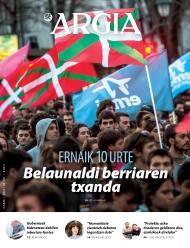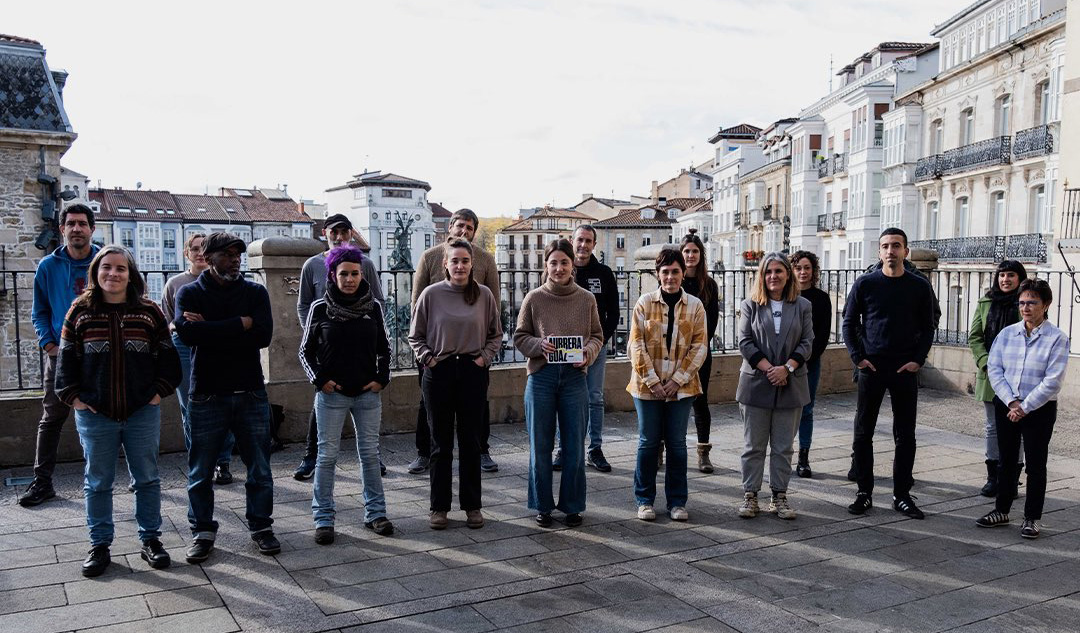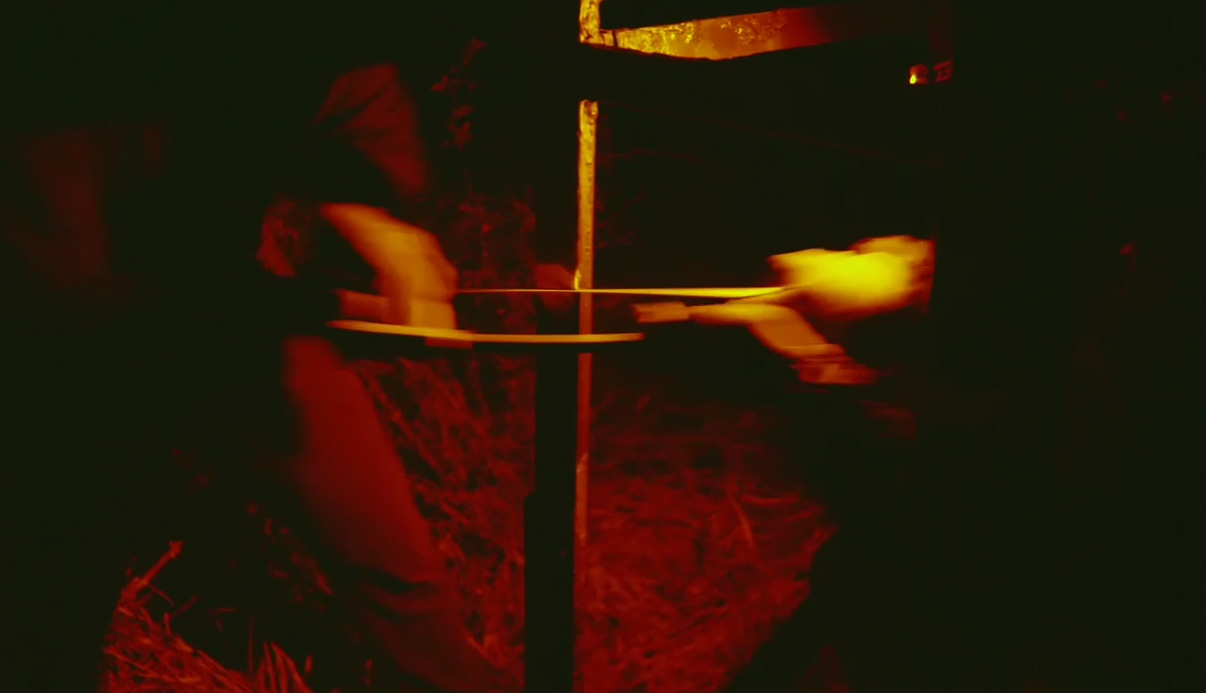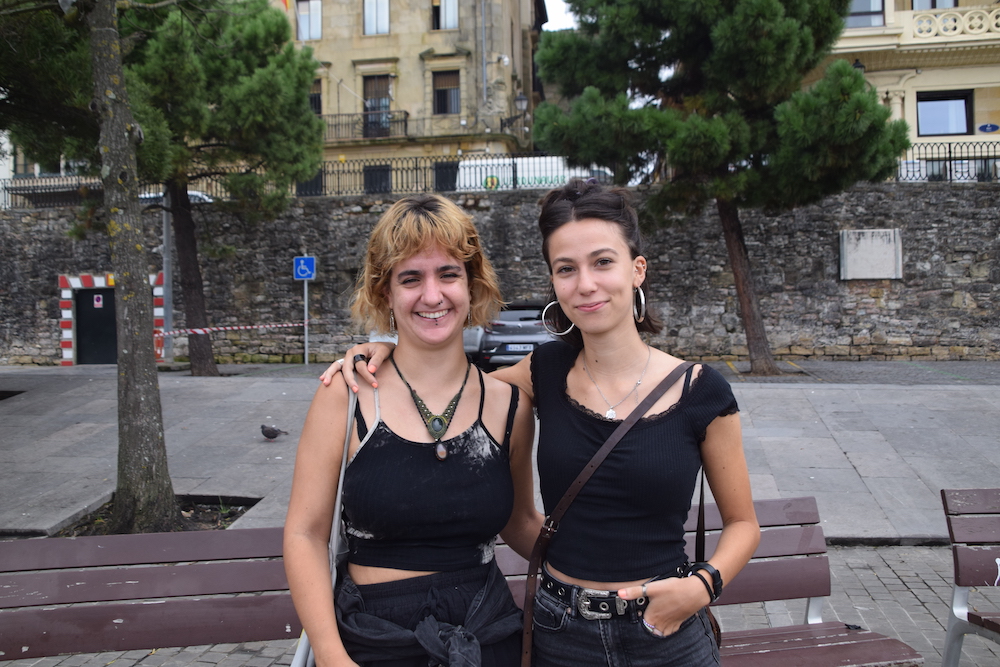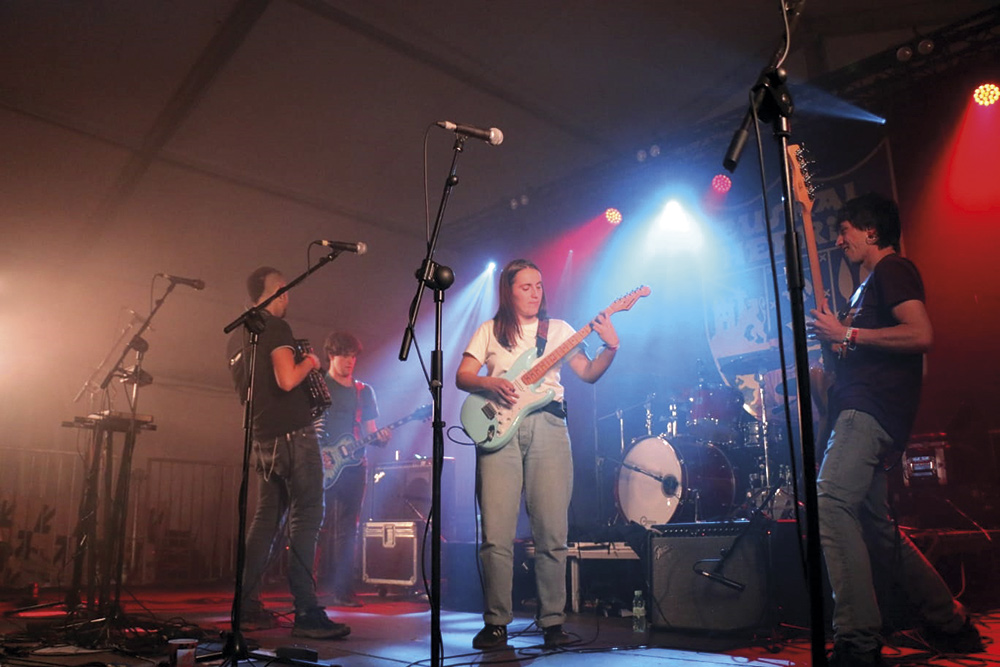Fighting for a way of living ten years
- The Ernai youth organization marks a decade on 2 March. In 2013, Estella launched the new youth organization of the left Abertzale, a generation that came from the era of repression and illegalization. There is currently no foundation in Ernai’s leadership, and just as the political and social context has undergone many changes, the organization has also been reformed.
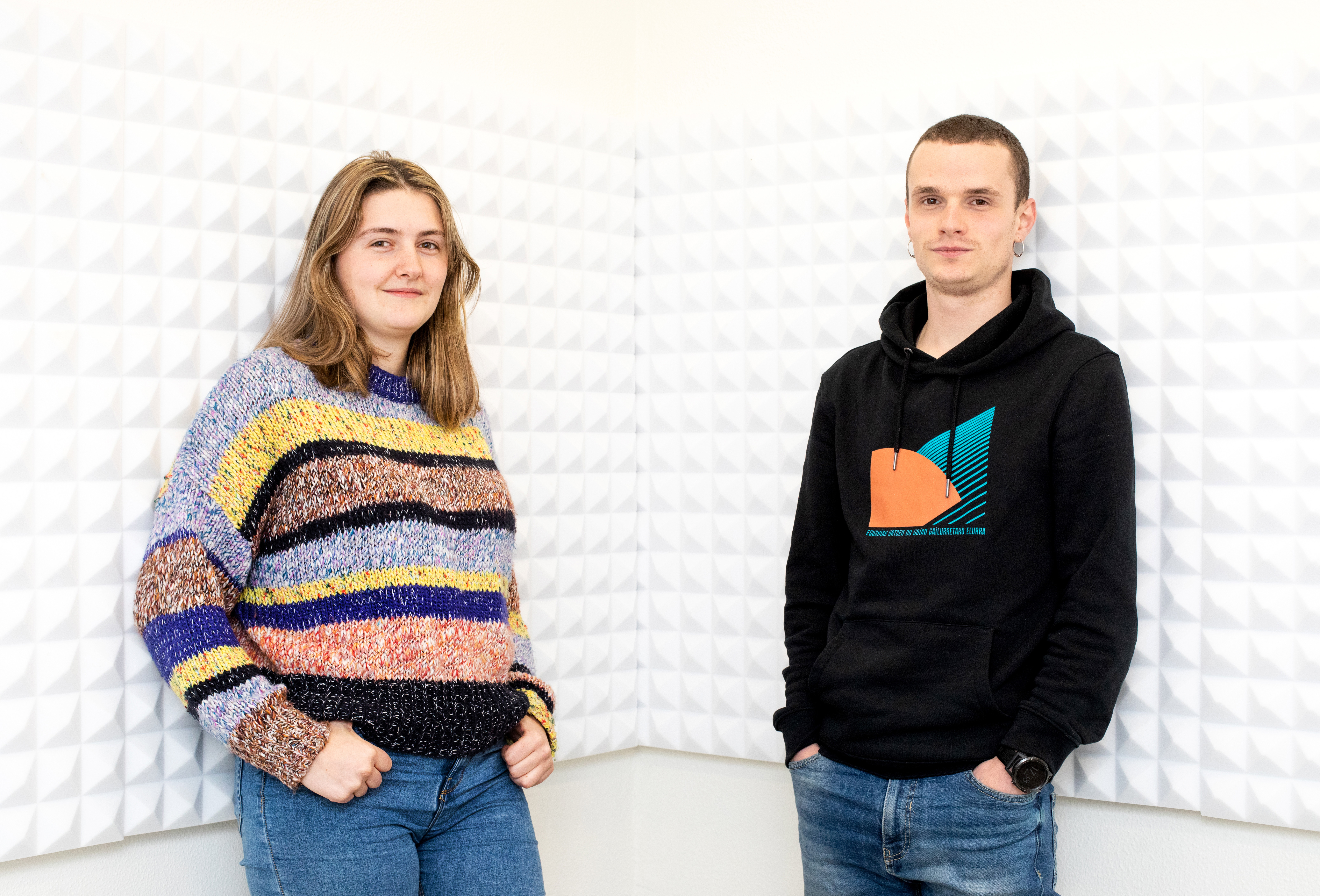
Current spokespersons, Ane Alava (Antsoain, 2000) and Txomin Aiartza (Larrabetzu, 2001), assure us that the new generation has received the transmission of the former, but has also brought freshness. Looking at the Gazte Topagune to be held from 6 to 9 April in Elorrio, III. They tell us the challenges and obstacles that have been set in the congress. They propose a “way of living” to exit the “generational crisis” and appeal to join the struggle.
Alava and Aiartza joined Ernaira in the “age of new impulses” at the age of 18: “An entire generation joined the militancy enthusiastically, but the following year came the pandemic and we were unable to make the transmission properly, especially in practice.” However, they claim that this period has been a period of formative prosperity, and that the congress closed last year in Olatzagutia has served them to “round off” the strategy for the coming years and to tackle the new march more vigorously.
Independence, socialism and feminism. With these three axes Ernai was created on 2 March 2013, and it remains the basis, but over ten years they have had to manage numerous cracks and debates. At that time, hundreds of young independentists proclaimed in Estella “Ernai da juventud”, culminating the ZukGua process. The process involved nearly 2,500 young people from Hego Euskal Herria, who highlighted that young Basques were rising “for hope”.
Neither Álava nor Aiertza knew the First Congress first of all, but they know where its organization comes from: “In 2013, he opted for hope in a change of strategy. The youth organization, colorful, lively, broad, adapted to the new political cycle, recovering its limited influence capacity in times of illegalization”, recalls Álava. He says that “hope”, rather than the context itself, was a political choice. They were reorganized a decade ago with the desire to break the system and have since suffered the repression of the system. More violent in the first few years, but it has lasted until today: arrests, accusations of various crimes, police beatings. However, his colleagues have not been quiet, and the mobilizations and all kinds of actions they have carried out during these years are known; those carried out in favor of the young people of Altsasu, the derribes of the Francoist crosses, the roadblocks to denounce precariousness, among others.
.jpg)
Tingling crack
II 2017. The organization came to Congress in an unstable situation, but they emphasized that they achieved eleven triumphs over obstacles and that the struggle was worth it. Despite being proclaimed as “victory generation”, the division of this generation became apparent. On April 1, the Inurritegia process in Erandio was closed with the aim of adapting the Abian process from the Abertzale left to the young strategy. But they did not get it right, as Aiartza confirmed: “One of the evaluations of the 2017 Congress, according to those of that time, could be that this specification was not fully known or that it was read after Abian what Ernai’s exact translation should be.” The congress lacked strategic and discursive clarification for the organization, according to the spokespersons.
Txomin Aiartza: “If Ernaik has succeeded in something, it is our initiative rather than the dependence of the GGS, for the benefit of our own strategy”
Voices dissatisfied with the new strategy questioned Ernai's path. “It is true that this congress widened a gap that had been emerging since previous years and has subsequently materialized in what is now known as GKS,” said Aiartza. However, the militants who supported the internal process continued the road and reaffirmed that they would encourage collaboration with the agents fighting in the Basque field, feminism and internationalism to “build Basque socialism today”.
Asked about Ernai’s strategy towards the GKS, Aiartza says that the main decision has been to develop his own direction: “On this issue, the youth organization has succeeded in something our initiative that in dependence, for the benefit of our own strategy.” He says that the political plan they prepared in 2018-2019 did so in those terms and the III of 2022. Congress.
.jpg)
The spokesmen say that GKS’s criticism of Ernai and the Abertzale left is not new: “The Abertzale left in these 60 years of its history has almost always had a sector or a current that is considered more left-wing than it has, which has made it political critical, because it is inter-class, because it has a concrete strategy, and we have always lived with it”. They are aware that the current context in Euskal Herria is different, but remember that Ernai’s struggle goes beyond the organization. “We need to know how to adapt to this reality. But we are not here to work on our brand, we are not organized to show the strength we have Ernain and to show and build our brand. We have a project that goes much further,” says Aiartza.
Alavés also stressed that the virtue of Ernai is that they collaborate with various popular and youth movements: “We develop most of the activity for the benefit of the broad popular movement. And that's the natural space of politicization for young people. In recent times, for example, many young girls have joined Ernaira from feminist groups and continue to work in the feminist movement.” They are therefore betting on combining the struggles of many movements.
New generations, freshness
III. The congress has brought a novelty to Ernaira, and so they have reached the tenth anniversary, with the same starting point, but with a new leadership and a new look, and the spokespeople have come to the conclusion that it is a weak and strong point. “Being a new generation in leadership created risks at one level but also opportunities. We have managed to maintain this balance almost intuitively, combining learning and political reflections from the previous generation with the new ideas and reflections that our generation has brought.” In the political plan of 2018, the formation of the young front, the activation of young people and the attraction of the wave of militants took place, taking advantage of the last congress to give “strategic scope” to this idea. In addition, new proposals have been put forward, such as the trans-Marivolla struggle, which so far have not been put at the centre.
Ane Alava: “The change of generation has brought freshness and allowed the development of the congress for the future and not the dependence of the previous congress”
Over 500 militants met on 25 June in Olatzagutia and approved Ehotz’s report, defining its strategy for the next four years. Many of them did not attend the two previous congresses, which was influenced, according to Álava, “Generational change has brought freshness and allowed this congress to develop in the future and not in a way dependent on the previous congress.”
This is not a dependency, but it remains the basis of what was said in Estella: its objective is independence, socialism and feminism, a people that will be stimulating for the young Basques. Álava himself emphasized in the congress that in order to achieve this goal “they will place special emphasis” on the promotion of “vindictive movements and the construction of alternative projects”.
.jpg)
Education and National Development
Olatzagutia defined two important lines of work for the coming years: education and internationalization. In October 2018, Ernai reported that he cut off his “strategic alliance” with the organization Ikasle Abertzaleak, arguing that “they were “totally distanced” from his “political vision and practice” about his education. They created the icam in institutes, universities and other schools to work in the line of the Abertzale left, but now in the 2022 congress they have formally received the renewal of Ernai's educational strategy.
In an interview conducted by ARGIA to Ernai in July 2018, one of the spokesmen of the time, Asier Zamorano, made self-criticism in this area: “I believe that in recent years we have not addressed this crude situation with the force and initiative he called for. In education we have done little recently. We have now begun to popularize a more structured discourse.” Almost five years later, Aiartza and Álava say they have managed to turn it around.
Ernai wants to turn this disengagement from the system and the Spanish and French States into political activation.
The commemoration of March 2 noted the decision to influence education, focusing on universities to ratify the organization as an educational agent and completing a broad program on campus. “Two years ago we completed the political proposal of universities, and we consider it essential that Ernai’s political dynamic be in them. Being the university a space where there are a lot of young people, it seemed important to us to be there.”
At the national level, they have read the picture: “We see that young people are not adhered to the Spanish and French States, but at the same time this lack of accession does not generate young independentists”. Ernai’s young people believe they have an “important role” in this, and “have taken charge” of “giving impetus throughout the national space.”
Youth activation, a challenge
One of the main conclusions drawn from the last congress has been the disadherence of young people to the system and capitalism, but also their passivity. “This disappointment does not become an effective and transformative political activation.” From this void arises Ernai’s great challenge: “building the young front”. But how do we create young independentists? How to promote the young wave? “It has a lot of the small,” Álava’s answer. “Our job is to connect with the problems we have in daily life and give them fighting spaces and give them spaces for the construction of alternatives.”
The spokespeople believe that big things can be achieved from small actions, so in recent months they are attaching importance to local dynamics. “This course has addressed the ideological struggle and socialization of claims, but it is true that we wanted to give special importance to local dynamics. We have addressed the concrete problems and the transformation of those that live by peoples.”
Ane Alava: “Our job is to connect with the problems we have on a day-to-day basis and give them fighting spaces, and to provide spaces for the construction of alternatives”
“One of the main challenges of all that moves in favor of social transformations is to read well what are the trends, pulsations and desires that are being strengthened within society and youth, and to connect them well with them.” Aiartza told the reflection in the organization: “In recent years there have been remarkable cultural changes, identities are no longer so rigid and solid, they are much more changing, more fragile, and that also has translation in militancy.” They speak of “liquid militancy” and add the tendency to activate youth only in their preferred lines or struggles, rather than engaging in more general projects. “We have to be able to adapt well to the trends that are being strengthened and make political proposals within them, understanding that we must be able to keep that tension well,” they explain.
.jpg)
In liquid times, they see militancy as a poem and encourage young people to do so. In the face of despair and in the context of the pandemic, Ernai’s action has been based on “Having a political project, a truly feasible strategy, slowly seeing the achievements…”. In short, they say that militancy is a way of living, as the slogan chosen for the Gazte Topagune says.
Young people plunged into the generational crisis
In his reading on the tenth anniversary, it became clear that cyisheteropatriarchal capitalism strikes this young generation differently. Among other things, because the capitalist system uses young people to obtain economic benefit: “It uses the most vulnerable sectors within the classes of peoples and workers, to continue from there the reproduction of the system and to achieve a greater accumulation of capital. Historically, youth has played this role, leveraging the youth workforce to achieve greater capital accumulation.” Álava adds in more detail: “Youth is a time when we are not masters of anything and from which the system is used. It exploits more violently young people who do not own anything and seek emancipation.”
In this context, the organization denounces that youth does not live an expectation, and that they cannot imagine a journey between now and 20-30 years, because living conditions have considerably worsened. In view of this, Ernai proposes “a radical change more than the measures that are the facial cleanliness of capitalism. Therefore, in the campaign launched since the beginning of the course we have tried to reflect that: now we have the opportunity to change everything.” They want to take advantage of the crisis to transform the system.
Meeting point for reflection
For ten years there have been numerous changes both in the Basque Country and internationally. The new debates have been put on the table and new approaches, together with the new generations, have been incorporated into old thinking. Álava and Aiartza have recognized that the most conflicting issue in the last congress has been marking the priorities of the lines of work. For example, in the face of the eco-social crisis they have not developed a youth strategy, although Ernai is making a “big bet” for environmentalism at the intergenerational table. Two other issues that have raised doubts have been decoloniality and anti-racism. “We take these problems into account, but we worry that Ernaik doesn’t have a speech with them.”
.jpg)
Although they are not part of the strategy, all these topics have been included in the broad programme they have prepared for Elorrio. “Gazte Topagunea is a small popular alternative built by hand and force, where we can make reflections.” After the Aberri Eguna, the Gazte Topagunea will be the meeting point for young people from all over Euskal Herria between 6 and 9 April, and the spokesmen say that uniting conferences and round tables has been a clear bet: they want to turn Elorrio into a place to address the controversies that exist today. The police model, the eco-social crisis, solutions to the energy crisis, migration, educational laws, the Basque country, models of masculinity, transfeminism, class struggle, international conflicts and the internationalist view... will have a wide range of conferences with relevant speakers, both national and international. Ernai's intention is to take advantage of the reflections of the meeting for the future.
“Gazte Topagunea is a small village alternative built by hand and force, where we can make reflections”
In addition, they will have dates for the celebration, they will praise the ten-year trajectory, but in general they want it to be time to bring together militants from youth organisations. “The key lies, among other things, in the attractiveness of the program itself and in the environment that is always created in the meetings: little sleep and the greatest day possible is the desire and desire of the promise”, summarizes Álava. Significant names such as Süne, author of this year's song, Merina Gris, Begiralak, Iheskide, Odei, Su Ta Gar, Olaia Inziarte, Lukie and other musical panorama groups have also been related to the night program.
Ernai wants to show that this way of life is possible, and that young people, in addition to being willing to party, also have the power of transformation, from independence, socialism, feminism, and from the multiple movements that have been taking place in recent years. They want to reaffirm that here and now they are braves, 21 years after the last meeting of Elorrio and 10 of the congress of Estella.
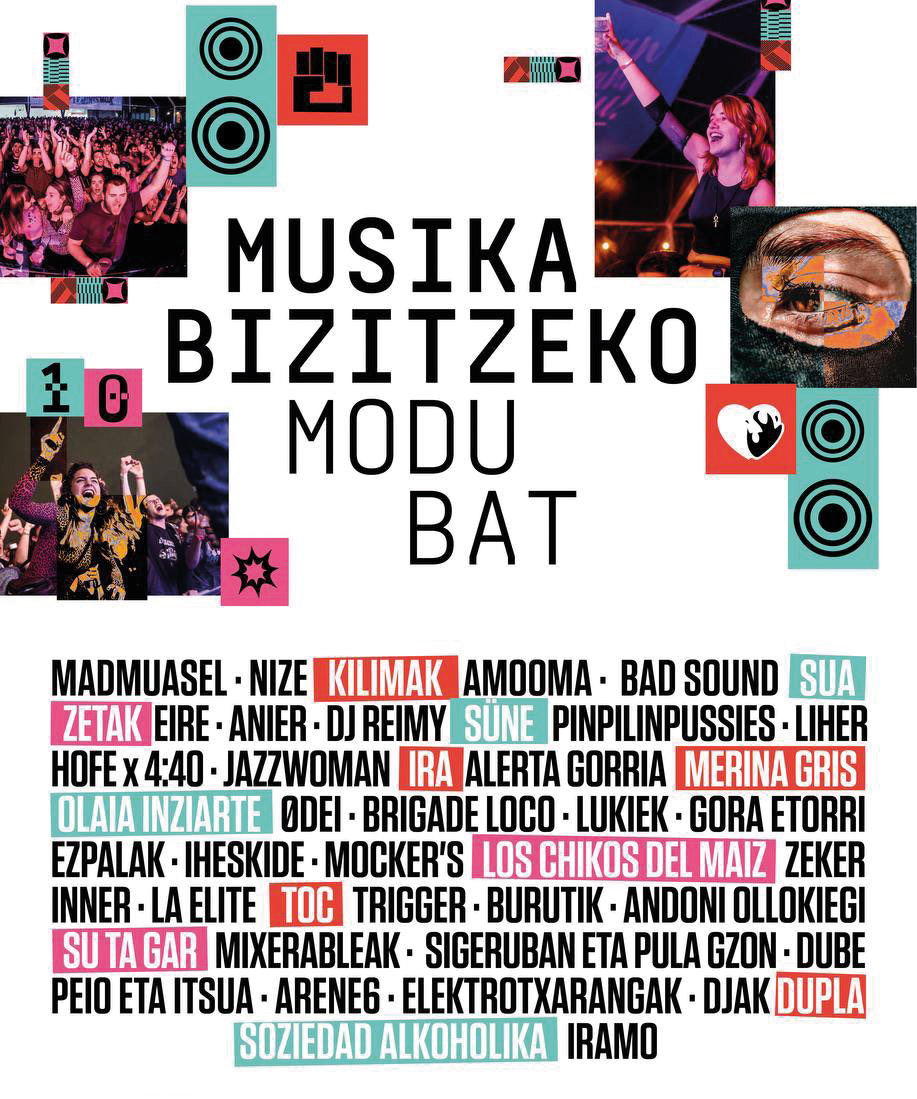

In memory of Josu Unanue.
We finish the fall, we are already in the winter. We have lived intensively in recent months in Euskal Herria in general, and in Busturialdea we have also noticed its reflection.
The street, reflecting many expressions, has been bordered to respond to... [+]
The Gernikarra singer Eñaut Elorrieta has written an excellent synthesis for our people, singing “we have come long, we go far”. And it's true, we're a long-term reality, and this region has something to say on that road. The Tree of Gernika remains shaded as it was for... [+]
Olaia Inziart made the saque on Thursday night at the Gazte Topagunea in Elorrio. Oronko was in charge of opening the small tent of organized concerts. It was even small to the surprise of singer Ezker Pareta. As the hours advanced, many decided to maintain their forces. The... [+]
Today it seems easier to imagine the end of the world than the end of patriarchy and capitalism. That I read, among many other things, Eraitz Saez and Lur Albizuri Gureak also, in the book of desire, power, epic, and it's true. In these times of collective crisis of expectations,... [+]









